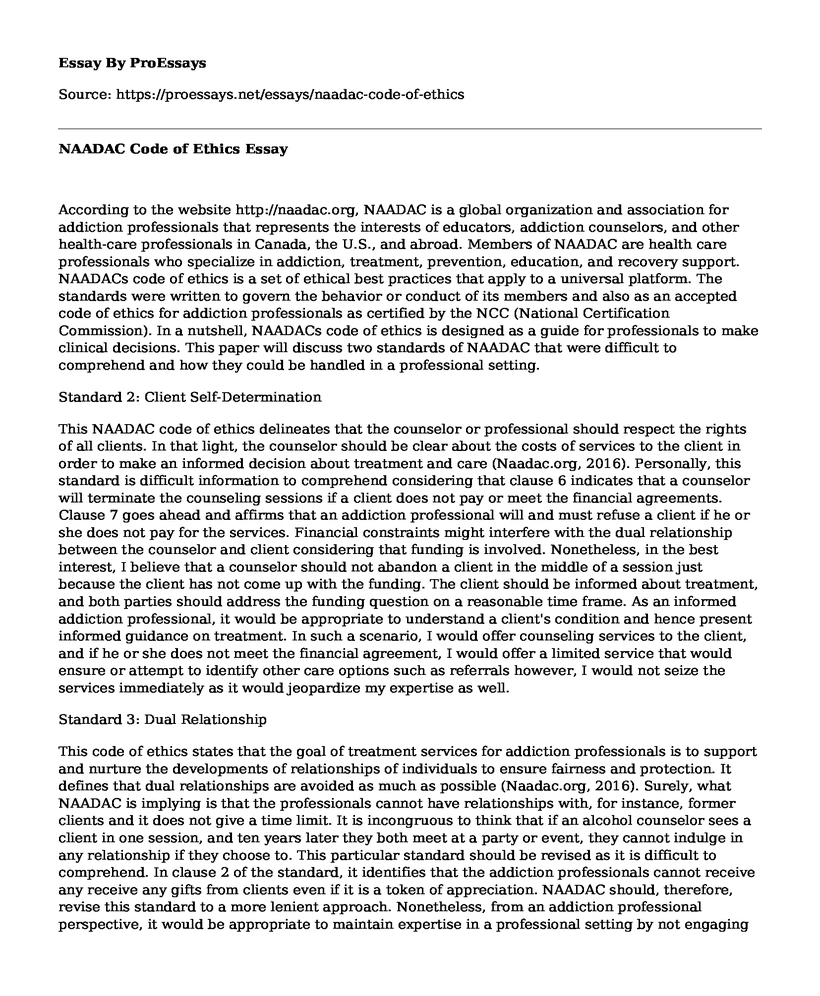According to the website http://naadac.org, NAADAC is a global organization and association for addiction professionals that represents the interests of educators, addiction counselors, and other health-care professionals in Canada, the U.S., and abroad. Members of NAADAC are health care professionals who specialize in addiction, treatment, prevention, education, and recovery support. NAADACs code of ethics is a set of ethical best practices that apply to a universal platform. The standards were written to govern the behavior or conduct of its members and also as an accepted code of ethics for addiction professionals as certified by the NCC (National Certification Commission). In a nutshell, NAADACs code of ethics is designed as a guide for professionals to make clinical decisions. This paper will discuss two standards of NAADAC that were difficult to comprehend and how they could be handled in a professional setting.
Standard 2: Client Self-Determination
This NAADAC code of ethics delineates that the counselor or professional should respect the rights of all clients. In that light, the counselor should be clear about the costs of services to the client in order to make an informed decision about treatment and care (Naadac.org, 2016). Personally, this standard is difficult information to comprehend considering that clause 6 indicates that a counselor will terminate the counseling sessions if a client does not pay or meet the financial agreements. Clause 7 goes ahead and affirms that an addiction professional will and must refuse a client if he or she does not pay for the services. Financial constraints might interfere with the dual relationship between the counselor and client considering that funding is involved. Nonetheless, in the best interest, I believe that a counselor should not abandon a client in the middle of a session just because the client has not come up with the funding. The client should be informed about treatment, and both parties should address the funding question on a reasonable time frame. As an informed addiction professional, it would be appropriate to understand a client's condition and hence present informed guidance on treatment. In such a scenario, I would offer counseling services to the client, and if he or she does not meet the financial agreement, I would offer a limited service that would ensure or attempt to identify other care options such as referrals however, I would not seize the services immediately as it would jeopardize my expertise as well.
Standard 3: Dual Relationship
This code of ethics states that the goal of treatment services for addiction professionals is to support and nurture the developments of relationships of individuals to ensure fairness and protection. It defines that dual relationships are avoided as much as possible (Naadac.org, 2016). Surely, what NAADAC is implying is that the professionals cannot have relationships with, for instance, former clients and it does not give a time limit. It is incongruous to think that if an alcohol counselor sees a client in one session, and ten years later they both meet at a party or event, they cannot indulge in any relationship if they choose to. This particular standard should be revised as it is difficult to comprehend. In clause 2 of the standard, it identifies that the addiction professionals cannot receive any receive any gifts from clients even if it is a token of appreciation. NAADAC should, therefore, revise this standard to a more lenient approach. Nonetheless, from an addiction professional perspective, it would be appropriate to maintain expertise in a professional setting by not engaging in relationships with clients since it might jeopardize the treatment process. Additionally, gifts from clients would be interpreted as a conflict of interest; this would be my approach to this standard in a formal setting.
Reference
Naadac.org,. (2016). Code of Ethics. Naadac.org. Retrieved 24 April 2016, from http://www.naadac.org/code-of-ethics
Cite this page
NAADAC Code of Ethics. (2021, Mar 13). Retrieved from https://proessays.net/essays/naadac-code-of-ethics
If you are the original author of this essay and no longer wish to have it published on the ProEssays website, please click below to request its removal:
- The Progressive Era: Emerging Concepts of Social Work and Social Welfare From 1900 to 1930
- Potential Interventions to Reduce Gun Violence in Schools Paper Example
- Excessive Alcohol Use: A Life-Threatening Disaster - Essay Sample
- Gaga Feminism: Sex, Gender & Cultural Shifts - Essay Sample
- Essay on Real World Human Interaction: Essential for Well-Being Beyond Social Media
- Toynbee's Study: Rise & Fall of Civilizations & Elite Leadership - Essay Sample
- Essay Example on Al-Qaeda: Global Terror Network with Extremist Roots







